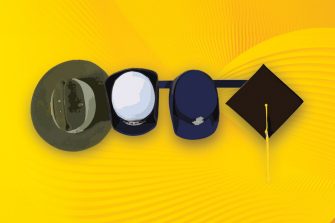
Matthew Hand
Business Development Associate — Defence at UNSW Canberra
Military background and education
10 Years 9 months full-time, 1 year part-time as a Parachute Rigger in the Australian Army reaching the rank of Corporal. My postings include RAAF Richmond, Australian Defence Force Parachuting School in Nowra and the Australia’s Federation Guard at ADFA. I was a free fall and static line paratrooper conducting HAPO descents from as high as 25000ft feet and as low as 1000ft.
My time was mostly spent away from home supporting SOCOM at major domestic training operations and time over in Perth supporting ongoing training. I was lucky to be part of a team who went to the Middle East in 2014 to support the humanitarian aid drops to Mount Sinjar, the first section of Parachute Riggers to do our job on operation since WWII. My education going into defence consisted of a Certificate III in Mechanical Engineering which I completed as a Fitter Machinist and discharging I received 3 diplomas through paid RPL and a Certificate IV in Government from the Defence College.
Educational journey
From 2018 to 2021, I applied for jobs repeatedly, coming up short each time. I began to realize that tertiary education held significant weight in hiring decisions. This was something I hadn’t fully understood before. My educational journey began during my final year in the Army, during the COVID lockdowns. I recognized the need to develop measurable skills, as experience alone, while valuable, wasn't as tangible as a degree. In today’s world, having a degree is essential. Observing how many people pursue higher education made it clear that to compete for jobs outside of defence, a Bachelor’s degree was a minimum requirement. In my opinion, experience at the NCO level wasn't enough on its own. I started applying to universities for a Bachelor of Business and got accepted.
My Recognition of Prior Learning (RPL) from my Diploma counted as one year of full-time study, reducing my degree from three years to two—a fantastic outcome that justified the $1,200 investment in RPL.
As I delved deeper into the university system, I discovered a program specifically designed for veterans. It offered a pathway to a Master’s program, bypassing the need for a Bachelor’s degree if I could provide proof of leadership. Given my rank in the Australian Army—four years as a Lance Corporal (LCPL) and one year as a Corporal (CPL)—I met the three-year leadership and management requirement. This enabled me to enrol in a Graduate Certificate in Business, which began with an introductory business course. This "University 101" class was a prerequisite to continue with the program, and the entire certificate took me from 2021 to 2023.
According to the Australian Qualifications Framework, a Graduate Certificate ranks higher than a Bachelor degree. This was crucial as I aimed to understand business functions to secure a job. After completing my Graduate Certificate, I decided to continue with a Master's degree to further solidify my position in the job market. A Master’s degree is highly regarded, as it demonstrates dedication to advanced tertiary education while balancing full-time work.
I chose UNSW for my Master’s because the program requires only eight subjects—four fewer than other universities. With my Graduate Certificate being recognized for RPL, I only needed to complete an additional four subjects to finish my Master’s.
While balancing work and study has meant sacrificing weekends and several weeknights, I view this as a temporary necessity. It's crucial to remain competitive in today’s world. Throughout this journey, I've had moments of both enjoyment and frustration.
"Studying has helped me discover areas of interest, such as marketing and finance which has been my only high distinction subject. This helped me understand my strengths and interests in the civilian job market and gave me valuable insights when considering future job opportunities."
Additionally, I’ve learned about theories like Self-Determination Theory, which focuses on fostering individual and team growth to flourish in their roles. Applying these concepts to myself has helped me enjoy and excel in my work.
Ultimately, I believe I’ve found an effective pathway for NCOs to navigate tertiary education. In just three years, I will have earned a Master of Business from one of the best business schools in the country and a top 20 university globally.
Transition to civilian career
Transitioning out of defence was both daunting and a significant shift for me. After spending 10 years moving around and working in the Army, it had become my norm. Adjusting to a new reality was challenging, but I was fortunate in finding my first job post-defence within a veteran team. I suited exactly what they needed—a Corporal who could action requests with some form of business education. Typically, this would be an officer’s role, given that they often have degrees from ADFA. However, I was actively studying for my Graduate Certificate and made that clear on my resume. This emphasis on tertiary education helped me stand out.
The support from my wife and family was invaluable during this transition. Leaving defence meant leaving behind friendships that were often tied to the unit I was in. It became essential to find a new community, whether at work, in a gym, or through joining new clubs. Building relationships outside of defence is non-negotiable—you need a support network beyond your military connections. Now, I only keep in touch with about three people from my time in defence. In my opinion, at the Other Ranks level, we operate primarily at the tactical level and often don’t fully grasp the operational or strategic aspects of our work.
"We execute the tasks rather than develop the strategy behind them, which can pigeonhole us into labour-intensive jobs or project management roles after service. This is why education is crucial—it broadens our understanding of the larger ecosystem and opens up more opportunities."
Too often, I’ve seen people with immense potential leave the Army only to become concreters, firefighters, or apprentices. While there’s nothing wrong with those careers, and you should pursue what makes you happy and where your strengths lie, it’s important not to limit yourself to the traditional pathways that other ranks often follow.
The transition has its difficulties, and there are times I consider returning to defence. However, the potential for growth outside of the military isn’t confined by my trade or the need to wait for someone to move on for a promotion. If I want a promotion, I can apply for new jobs in different places. This freedom to control my career is something I didn’t experience in defence.
Personal reflection
Reflecting on my journey, I'm proud of the steps I've taken to ensure my growth both educationally and professionally. As an average person who was an average soldier, I haven't achieved anything that a regular person couldn't do. Navigating the challenges of transitioning out of defence and into the civilian workforce was no small feat, but my dedication to continuous learning has paid off. Pursuing higher education, even while still in the Army, gave me the tools and confidence to stand out in a competitive job market.
While it wasn't easy balancing work, study, and adjusting to a new reality, I've discovered new passions, like marketing and finance, that have opened doors I hadn't previously considered. The support from my family and my commitment to building new communities have been instrumental in this transition.
Ultimately, I've proven to myself that with the right mindset and a willingness to invest in education, the opportunities are endless. My journey has shown me that we can break free from traditional paths and carve out a future that aligns with our ambitions and strengths. I'm excited about what lies ahead and confident that I'm on the right path.
Advice to future student veterans
If you’ve ever thought about studying even for a second, give it a go. There's no harm in trying and you can stop whenever you want. It can provide a sense of progress, especially during times when you might feel stuck. Completing each subject is a reminder that you're moving forward. For me, earning a Master’s degree became more than just a qualification — it showed me that a typical person can get a Master's degree, and achieve more than they thought possible, you just have to find a pathway. Take the leap and invest in yourself and your personal growth, take control.
Learn more
Contact us
If you have any questions or general queries about our Veterans program, please get in touch: veterans@unsw.edu.au.

